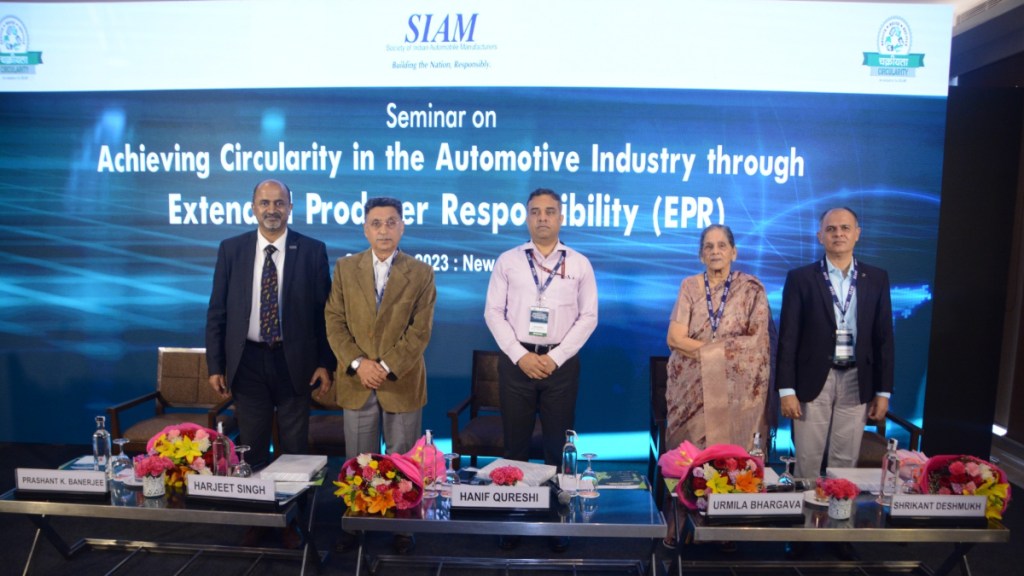In order to drive a circular economy, the Society of Indian Automobile Manufacturers (SIAM), yesterday organised a seminar on ‘Achieving Circularity in the Automotive Industry through Extended Producer Responsibility (EPR)’. Held under the umbrella of SIAM’s Chakriyata (Circularity) initiative, this event aligned with the vision of the Government of India’s aim to promote sustainable mobility and foster a circular economy.
The seminar emphasised how effective EPR implementation can contribute to Aatmanirbhar Bharat, Circular Economy, Decarbonisation, LiFE (Lifestyle for Environment) and achieve targets of UN Sustainable Development Goals 2030.
EPR: Key tool for low-carbon transition in Automotive Industry
The event witnessed participation of several coveted speakers including senior government officials, industry leaders, and automobile experts, discussing the ways to enhance their commitment to sustainable practices, reduce environmental impact and support the nation’s vision for self-reliance and circularity in the automotive sector.
The inaugural session, themed “EPR- A key tool for low-carbon transition in the Automotive Industry”, was graced by Chief Guest Dr Hanif Qureshi, Joint Secretary, Ministry of Heavy Industries. The session also witnessed the participation of key dignitaries from SIAM, Mercedes Benz India, Hero MotoCorp and IFP Petro.
In his welcome address on behalf of the automobile industry, Prashant K Banerjee, Executive Director, SIAM, said, “ERP is an integral part of the Government of India’s vision for a circular economy. Considering the wastes our industry generates, we have a fantastic opportunity to turn them into assets.”
Speaking on the same, Dr Hanif Qureshi, said, “The PLI programme is one of the government’s futuristic initiatives towards realising the sustainability goals by supporting industries to operate in a sustainable way. India manufactured 2.6 crore vehicles in the FY 2022-23 due to PLI and PLI ACC schemes.”
Shrikant Deshmukh, Chairperson, SIAM Recycling Group, said, “Understanding and religiously following ERP has become essential to create a sustainable future and we must outline a strategic framework to move towards the same. The Indian motor industry has consistently backed government efforts to promote the circular economy because it holds these ideas in high respect.”
Urmila Bhargava, Chairperson, IFP Petro, encouraged participants to move swiftly towards creating a robust ecosystem for the growth of the circular economy. She highlighted why India should place greater emphasis on the collection of used oil, recycling and reusing it.
The main event was divided into three thematic sessions. The first session was based on the theme “ERP Regime for Battery and E-waste Management”, while the second session focused on “ERP Regime for Used Oil and Plastic Waste Management”. The third thematic session was based on the theme “ERP Regime for Tyre Waste & ELV Management”.
The thematic sessions were followed by a panel discussion around “Extended Producer Responsibility Fostering SDG 2030”. Noted influentials from the recycling industry including Maruti Suzuki Toyotsu India, AKK Recycling, and Rosmerta Group took part in the discussion and shared their insights on how effective EPR implementation will facilitate the attainment of SDG goals by 2030.
“At Rosmerta Technologies, we recognize the importance of managing End-of-Life Vehicles (ELVs) for a sustainable future. Extended Producer Responsibility (EPR) enables OEMs to reduce their environmental impact, support recycling costs, and promote the use of recycled materials,” said Kartick V Nagpal, President of Rosmerta Technologies.
The speakers at the seminar underlined the specific responsibility to achieve circularity and the necessity for implementing sustainability and circularity principles at the very early stage, beginning from product designing.



















